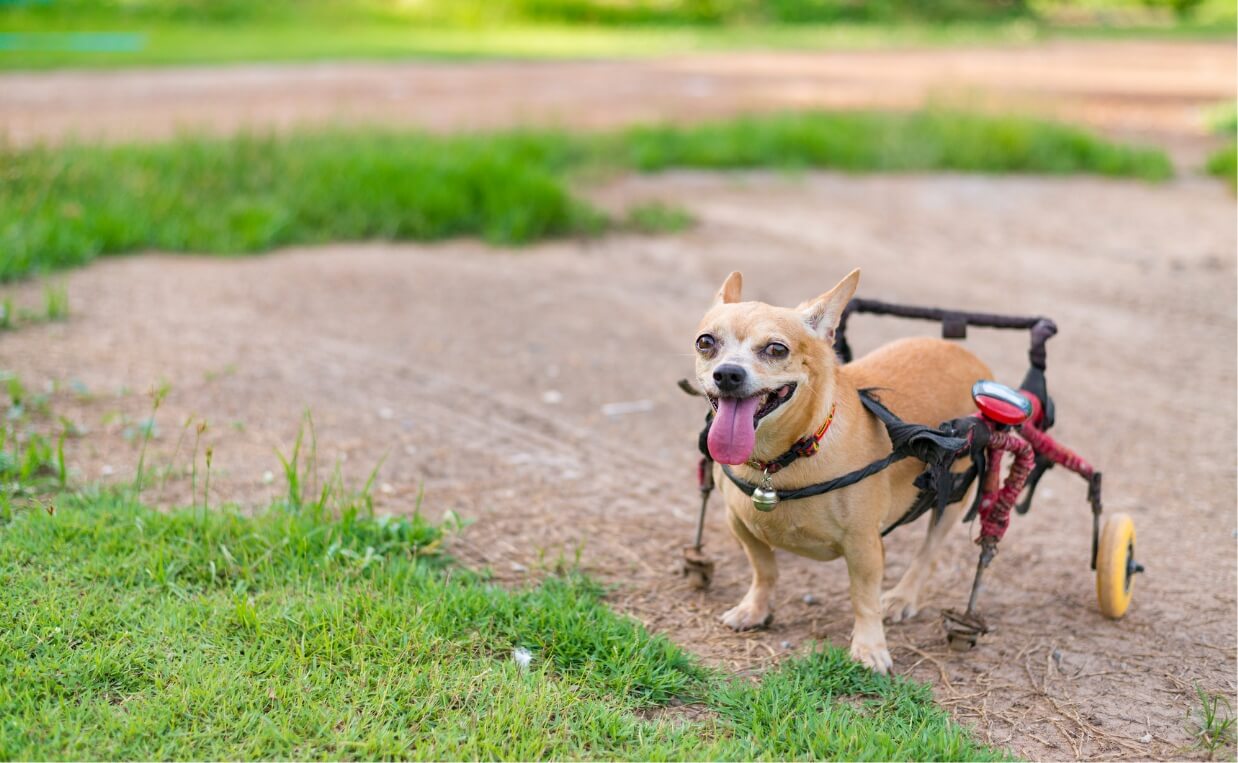
Annually on May 3rd, National Specially-Abled Pets Day shines a spotlight on the needs of pets with disabilities. In light of the national observance, it seems fitting to highlight the need for homes for dogs who have medical issues and are living in shelters.
Adopting a dog from a shelter is really a wonderful thing to do. At any one time there are approximately 4 million dogs in shelters across the United States, and about 20 percent of them will never be adopted. They can also be a little more challenging to parent when they have special needs. The key to being a successful dog rescue parent is understanding, and having compassion for, dogs with special challenges.

Here are 6 factors to consider when thinking about adopting a dog with medical issues.
-
What is the dog’s diagnosis?
There are many different medical issues the dog could be experiencing. It could be a health issue relatively easy to remedy, such as skin issues, digestive problems, allergies or ear infections. It could be something chronic but usually treatable, like obesity, dental disease or anemia. Or, it could be a permanent or life-threatening injury or illness, like cancer, limb amputation, genetic defect, hearing or sight loss.
A long-term prognosis can help you make the right decision for both you and the dog. Some conditions may be a relatively easy fix while others may require intensive care for the life of the animal.

-
What lifestyle changes will be needed?
Will you have to make major adjustments to your current lifestyle or will you be able to easily accommodate the dog’s feeding, medication and exercise routines? Some dogs require medication administration several times a day. Will you be able to adjust your work and leisure plans around his or her needs?
Read more: 10 Tips to Get Your Dog to Take Medicine
-
Will the dog fit in with your family and other pets?
This is a consideration for anyone thinking about adopting a new dog, regardless of medical issues. However, dogs with medical conditions sometimes have different mannerisms and needs. Sometimes disabled or medically fragile dogs don’t feel like playing with a young child or a younger dog. Dogs who have seizures are often attacked by other dogs. Can you make arrangements to ensure everyone is safe and kept apart if something like this happens?

-
Does your house work for the dog?
Sometimes dogs have mobility issues and can’t handle a lot of stairs. Are you prepared to carry the dog in and out of the house in this type of situation?
-
What will the medical care cost?
Any dog parent can tell you there are always some costs involved in having a dog. However, dogs with medical issues often have much higher medical care costs if you adopt a dog with complex medical issues. This is another reason it’s imperative you have a diagnosis of the dog’s medical condition so you can assess whether you are in a position to afford the dog. Special equipment, specific food and possible ongoing veterinary costs (including hospitalizations, diagnosis tests, surgeries, etc.) need to factor into your decision.

-
What about behavioral issues?
Sometimes the behavior history of a dog is unknown, but most of the time the previous owners are willing to fill out a history form. These forms are very helpful in providing information about the dog’s past behavior. This information will help you know whether you are ready to take on certain behavior issues. Most shelters will also perform behavior evaluations and can inform you about a potential behavioral concern a dog may have. Shelter workers spend time with the dogs and are often able to identify certain behavioral issues a dog may be displaying. Use this information to help you decide whether this animal is right for you, your family, and other pets in your household.

In the end, adopting a dog with medical challenges may be a rewarding experience for everyone involved. Dogs with health conditions are as deserving as any other dog of a home filled with love, play, adventure and comfort. So, take some time and think deeply about the needs of the dog and whether you are the best person to take on the added responsibility. And, if you take the leap, be prepared to enjoy a very special relationship.

Have you adopted a dog with special needs? Please share your experience in the comments below.

 What You Need to Know About Trazodone for Dogs
What You Need to Know About Trazodone for Dogs What to Put in a Dog First Aid Kit
What to Put in a Dog First Aid Kit A Guide to Laser Therapy for Dogs
A Guide to Laser Therapy for Dogs 10 Ways to Keep Your Dog Safe During the Fourth of July
10 Ways to Keep Your Dog Safe During the Fourth of July 16 Tips to Keep Your Dog Safe and Comfortable During Winter Weather
16 Tips to Keep Your Dog Safe and Comfortable During Winter Weather






Leave a Reply